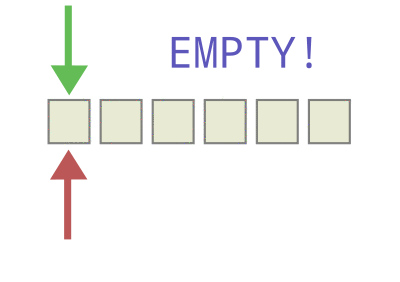A minimal fifo circular buffer library for embedded systems [limited to 255 array size]. You should:
- initialize a normal array.
uint16_t data[3]; // array I want to use as buffer- assign it to a buffer object.
volatile Buffer b;
b = initBuffer(data, sizeof(data[0]), sizeof(data)/sizeof(data[0]));- use enq/deq to add/read data.
uint16_t dataIn; // holder for bytes I want to save in buffer
uint16_t dataOut; // holder for bytes I will later read from buffer
enq(&dataIn,&b) // add element to object
deq(&dataOut,&b) // read from buffer and store it in data outdefualt behaviour
BLOCK_WHEN_FULLis set to 1, set it to zero inbuffers.hif you want it to work as a fifo and overwrite old data when full.
- it is fun.
- it is efficeint in using memory.
#include<buffers.h>
volatile Buffer b; // buffer object
uint16_t data[3]; // array I want to use as buffer
// single data example
uint16_t dataIn; // holder for bytes I want to save in buffer
uint16_t dataOut; // holder for bytes I will later read from buffer
int main(){
// initialize the buffer object
b = initBuffer(data, sizeof(data[0]), sizeof(data)/sizeof(data[0]));
// single data wirte/read
dataIn = 1;
enq(&dataIn,&b) // add element to object
deq(&dataOut,&b) // read from buffer and store it in data out
}#include<buffers.h>
volatile Buffer b; // buffer object
uint16_t data[3]; // array I want to use as buffer
// multiple data example
uint16_t nDataIn[3] = {1,2,3}; // holder for bytes I want to save in buffer
uint16_t nDataOut[3] = {0,0,0}; // holder for bytes I will later read from buffer
int main(){
// initialize the buffer object
b = initBuffer(data, sizeof(data[0]), sizeof(data)/sizeof(data[0]));
nEnq(&nDataIn,&b,3);
nDeq(&nDataOut,&b,3); // now nDataOut = [1,2,3];
// supports partial buffer read/write
reset(&b) resets the buffer object to initial state
nDataIn[0] = 4;
nDataIn[1] = 5;
nDataIn[3] = 6;
nEnq(&nDataIn,&b,3);
nDeq(&nDataOut,&b,2); // reads only 2 elemetns -> nDataOut = [4,5,3];
return 0;
}The Buffer structure represents a standard circular buffer. It contains the following fields:
void *array: This is a pointer to the array that is used as the buffer.uint8_t elementSize: This field represents the size (in bytes) of each element in the buffer.uint8_t arraySize: This field represents the number of elements in the array.uint8_t head: This is the write index. It points to where the next element will be written.uint8_t tail: This is the read index. It points to where the next element will be read.bool isEmpty: This field istrueif there are no elements in the buffer, andfalseotherwise.bool isFull: This field istrueif the buffer has overflowed at some point (i.e., data has been lost), andfalseotherwise.uint8_t whatIsLife: This is used for debugging.
-
Buffer initBuffer(void *array, uint8_t elementSize, uint8_t arraySize): Initializes aBufferwith the given array, element size, and array size. -
void enq(void *data, volatile Buffer *buffer): Enqueues (adds) the given data to the buffer. -
void deq(void *data, volatile Buffer *buffer): Dequeues (removes) data from the buffer and stores it in the location pointed to bydata. -
void nEnq(void *data, volatile Buffer *buffer, uint8_t size): Enqueues a number of elements specified bysizefrom the data to the buffer. -
void nDeq(void *data, volatile Buffer *buffer, uint8_t size): Dequeues a number of elements specified bysizefrom the buffer and stores them in the location pointed to bydata. -
void reset(volatile Buffer *buffer): Resets the buffer, clearing all data. -
uint8_t howMuchData(volatile Buffer *buffer): Returns the amount of data currently stored in the buffer.
Created by: Waleed Alghilan, Apr-2024 (Artificial Hands Area in Scuola Superiore Sant'Anna)
